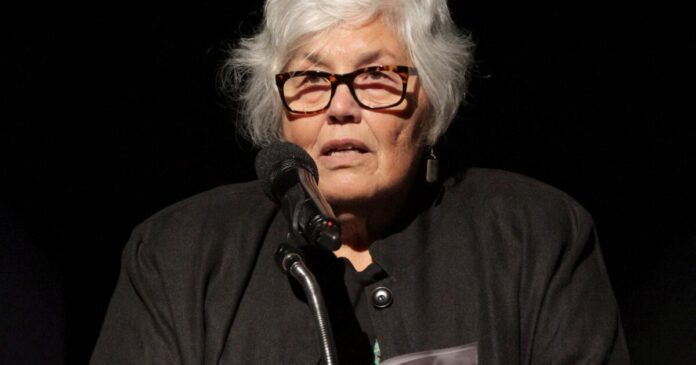Influential documentary filmmaker Lourdes Portillo, who used her artwork as social activism to light up the struggles of the working class, has died.
The Mexico native, who made “The Satan By no means Sleeps” in 1994, and acquired an Oscar-nomination for her 1985 movie, “The Moms of the Plaza de Mayo,” died Saturday morning at her residence in San Francisco, in accordance with her good friend and fellow filmmaker Soco Aguilar.
Portillo, who had been identified with pancreatic most cancers a number of months in the past, was 80.
“She was a trailblazer — even as much as the final minute,” Aguilar mentioned in an interview. “She was very robust — she was a warrior — and she or he was utterly at peace and completely satisfied about all that she had completed in her life.”
Simply final 12 months, the Academy Museum of Movement Footage paid tribute to Portillo with a retrospective and gallery to have fun her life and groundbreaking profession. Portillo centered most on points affecting girls in her native Mexico and past. In “The Moms of the Plaza de Mayo,” she elevated the reason for a gaggle of Argentine girls who usually convened at a plaza in Buenos Aires to recollect the kids who disappeared throughout that nation’s political strife within the late Nineteen Seventies and early Eighties.
“The Satan By no means Sleeps” was in regards to the mysterious homicide of her uncle, Oscar Ruiz Almeida, in her residence state of Chihuahua.
Her documentaries typically took the type of journalism. Often, her work was controversial.
Amongst her movies had been “The Days of the Lifeless” (1989); “Corpus: A Dwelling Film for Selena” (1999), in regards to the life and legacy of slain Tejano singer Selena Quintanilla; and “Señorita Extraviada” (2001), a documentary in regards to the disappearance of younger girls in Ciudad Juárez, Mexico, a movie that was honored with a Particular Jury Prize on the Sundance Movie Competition.
She had been engaged on a last undertaking with efficiency artist Guillermo Gómez-Peña in San Francisco.
Portillo was born in Chihuahua, Mexico, in 1943.
Starting within the third grade, her dad and mom despatched her throughout the border into the U.S. to attend Catholic College. When she was in her teenagers, her household moved to Los Angeles. She received her begin within the movie world on the age of 21, when a good friend requested her to assist with a documentary.
“The truth of residing in america as an immigrant, it’s very painful, as a result of the very first thing that occurs to you is that you just notice that everyone’s attempting to crush your sense of ‘can do,’” Portillo informed the Academy Museum in an interview final 12 months. “Your sense of actually being necessary on this society, having one thing to say. You’re already diminished.”
She moved to San Francisco within the Nineteen Seventies, the place she joined that metropolis’s burgeoning artwork neighborhood. She landed a job as a first-camera assistant whereas a part of a collective known as Cine Manifest. In 1978, she graduated from the San Francisco Artwork Institute.
“That was the start of pondering that I might make movies that would truly transfer individuals to do one thing that may be good for everyone,” she mentioned through the Academy Museum interview.
With funds from the American Movie Institute Impartial Filmmaker Award, she went on to make the quick documentary “After the Earthquake,” a couple of Nicaraguan refugee in San Francisco, adopted by her extra notable movies.
“She was robust and she or he knew what she needed to say … speaking about tough conditions with such an artistry,” Aguilar mentioned. “She was an activist in the way in which she crafted her movies, and that made her extraordinary. She was forward of her time.”
She is survived by her sister in Los Angeles and three sons.














